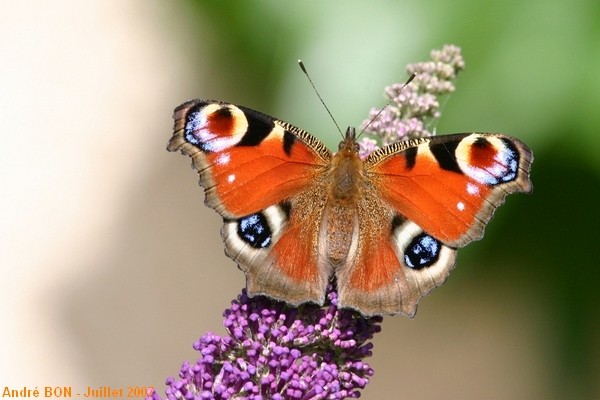








| Peacock (Inachis io (Linnaeus, 1758)) |









|
|
Scientific name: Inachis io (Linnaeus, 1758) Common name: Peacock French name: Paon du jour Order: Lepidoptera Suborder: Rhopalocera Family: Nymphalidae Subfamily: Nymphalinae Wingspan: 54-60 mm Biotope: Widespread in many habitats. Geographic area: Europe except North of Scandinavia and North of Scotland. Temperate Asia. Flight time: July to October. Number of generations : 1 Caterpillar: Shiny black, hairy with white spots. Host plant: Nettles (groups of caterpillars) and sometimes hops. |
The bright red upper side of the wing, with a clear eye pattern, contrasts with the black brownish underside. This dark underside colour provides a good camouflage while resting and during winter. The eye patterns are exposed to frighten any eventual predator. Both sexes are similar. The Peacock flies from the middle of Summer to the first cold days. Then it appears again at the beginning of Spring after having wintered in a tree or a building. |
| [To know more about the Peacock] [Next picture] [Top] |

|
Peacocks are regular visitors of the Buddleia flowers in my garden. Here is my best picture at this time. |
| [To know more about the Peacock] [Next picture] [Previous picture] [Top] |

|
Light is beautiful at the end of this afternoon of June. A Peacock, landed on the ground, flies away as I come near. I stop at a small distance and it lands exactly at the same place. I walk closer with my camera, it flies away, I walk the other way, it lands again at the same place. I must find something to take this picture. Nobody in the area… I get closer, but crawling on the ground, in the direction of the backside of the butterfly. This works! I am even able to have the camera, less than 30cm, on top of the Peacock. |
| [To know more about the Peacock] [Next picture] [Previous picture] [Top] |

|
Peacocks enjoy resting in the sun light. We can even take pictures of the underside. |
| [To know more about the Peacock] [Next picture] [Previous picture] [Top] |

|
The dark colour of the underside of the Peacock's wings really contrasts with the bright colours of the upper side. I had difficulties to get a correct exposure. I think that the best way is to use exposure memorization pointing to a paler thing (leaf, trunk, etc.). |
| [To know more about the Peacock] [Next picture] [Previous picture] [Top] |

|
A little underexposed. I shot with the flash, the next one will be better. |
| [To know more about the Peacock] [Next picture] [Previous picture] [Top] |

|
A colony of caterpillars, at their first development stage, on a Nettle. |
| [To know more about the Peacock] [Next picture] [Previous picture] [Top] |

|
The Peacock caterpillars, at their last development stage, are black with white dots and long spines. They have black legs and orange pro-legs. |
| [To know more about the Peacock] [Next picture] [Previous picture] [Top] |

|
I have observed this caterpillar in a clearing. There were some pieces of black caterpillar skin on the Nettles in the vicinity. Are these dead caterpillars or are these remains after molting? |
| [To know more about the Peacock] [Previous picture] [Top] |

|
Some Peacocks sometimes winter hanging upside down on the ceiling of my garage. They fly out on the first hot days of the next Spring. |